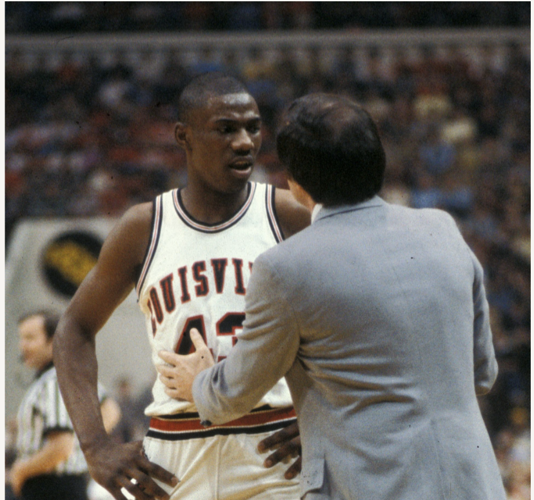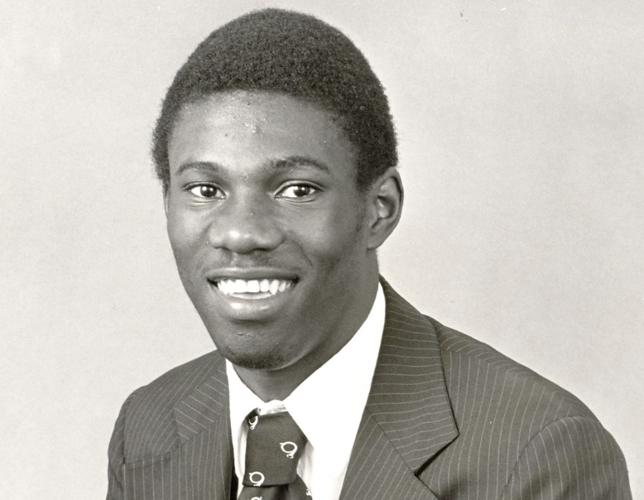LOUISVILLE, Ky. (WDRB) — The return of the Derek Smith Shootout is the most joyful addition to the local basketball calendar of the year.
The chance to watch 12 local high school boys' basketball teams compete from 2 p.m. until 8 p.m. at Male High School next Tuesday is an opportunity to see which players have the Derek Smith spirit of unlimited tenacity.
The involvement of Derek's daughter, Sydney, and the in-town presence of his son, Nolan, and wife, Monica, enhance the moment, especially two days after Father's Day. Sydney and Nolan were everything to Derek, who was 36 years old when he died from a heart issue in 1996.
"This event was very, very important to us to bring back because when we moved back to Louisville (a year ago) we wanted to pick up where my Dad left off," Sydney Smith said.
"This city means a lot to my family. It means a lot to my father. So to get involved in the community, specifically the basketball community is very, very, very special to us as a family."
I'll get back to the basketball tournament, which will feature teams from Holy Cross, Moore, Male, Butler, Christian Academy, Central, Ballard, Western, Trinity, Evangel, Manual and DeSales.
But writing about Smith has always been special to me because in more than 40 years of covering University of Louisville basketball, I have not encountered anybody with Smith's captivating blend of intelligence, curiosity, determination, leadership and achievement.
The players on the 12 participating teams need to know Derek Smith as more than a name on a 6-game basketball tournament. He was about overcoming challenges, building relationships and never surrendering to doubt.
Smith came to Louisville from Hogansville, Georgia, in the summer of 1978. He was 16. Skeptics labeled him a tweener, not good enough with the jump shot to play guard but not smooth enough with the basketball to do great things at small forward.
Scooter McCray was considered the best prospect in that group of Denny Crum freshmen. Jerry Eaves, who starred at Ballard High School, was the No. 2 recruit. Smith was not better than third or fourth.
Somebody likely wrote that or told it to Smith because all he did over the next four seasons was terrorize every Louisville basketball practice with his boundless energy.
He became a dependable shooter who made at least 54% attempts every season, while shooting 57.7% and averaging 13.9 points for his career. He never missed a game, not one over 133 games that featured 101 victories, two Final Fours and the school's signature 1980 national title. If you check the record book, Smith remains the program's No. 7 all-time leading scorer with 1,826 points.
Some tweener.
There are a million Derek Smith stories. But few are as uplifting as the way he watched himself flub one of his early television interviews and told himself that he would never flub another.
He practiced talking slower and more clearly. He researched public speaking. He became a Go To Interview in the Louisville locker room (in the days when the Louisville locker room was actually open to the media).
The NBA doubted Smith as much as the recruiting experts. I remember talking to Smith the day after the Golden Warriors selected him with the 35th pick of the second round in the 1982 Draft.
He was not disappointed. He was energized. He was fueled by doing things you told him he could not do. As a rookie Smith became more motivated when Golden State slow-played him, giving Smith less than 6 minutes per game on a miserable 30-52 team.
The Warriors released Smith in September 1983. Five days days later he signed with the San Diego Clippers, who were coached by Jim Lynam. Lynam believed in Derek Smith the way U of L coach Denny Crum believed in Derek Smith.
By the end of his second season with the Clippers, Smith started. By his third season, Smith led the Clippers in scoring at 22.1 points per game, scoring 30 or more in 10 games.
One of those games was the one below, when he dropped 33 on the Chicago Bulls, including a thunderous dunk on a rookie named Michael Jordan, a play that remains a YouTube sensation nearly four decades later.
Although Smith averaged more points per game than Kareem Abdul-Jabbar, Isiah Thomas or Hakeem Olajuwon that season, he was on a losing team, hidden in San Diego (a basketball wasteland) and still considered a long-shot former second-round draft pick.
All that changed in 1985-86.
The players in the Derek Smith Shootout on Tuesday need to memorize these numbers. In his fourth NBA season, Smith came out playing like a guy determined to win the scoring title and MVP award.
This was his performance in his first 9 games:
*36 points, making 14 of 19 shots against Sacramento,
*26 against Houston.
*28 while going 12 for 20 against Portland.
*21 while making 9 of 16 against the Bulls.
*14 against the Knicks.
*35, while making 13 of 19 against Houston.
*29 while draining 11 of 12 free throws against Atlanta.
*29 against the Warriors.
*26 against Seattle.
The Clippers, a perennial loser, won their first five. Smith averaged 27.1 points, while making 55.9% of his shots. People were talking about Derek Smith.
He was going to be an all-star. He was going to get a jumbo contract. He was going to the playoffs.
And then he wasn't.
Smith suffered a terrible injury to his right knee. It was one of those stumbles where you don't want to watch the replay. His season was over with surgery after 11 games.
Smith ferociously rehabbed his knee — and the Clippers rewarded him the Clippers' way, by trading him to Sacramento.
He was never the same player, but he played with the same spirit. Lynam went to Philadelphia and wanted Smith in his locker room to drive younger players like Charles Barkley, Johnny Dawkins and, yes, Kenny Payne. He played on Sixers' playoff teams in 1989 and 1990.
After a final season in Boston, Smith returned to Louisville to determine his future after playing basketball. He thought that he would become a coach, but he wanted to be certain.
Lynam and general manager John Nash never had any doubts about where Smith was needed. Lynam replaced Wes Unseld as the Washington (then) Bullets head coach.
In 1994, he recruited Smith as his top assistant. He served the team for two seasons before his tragic death on cruise with his family and the Bullets' organization in August, 1996. Smith was buried at Cave Hill Cemetery with players from a string of NBA teams in attendance.
Derek Smith would have become an NBA head coach. Or he would have become the head coach at the University of Louisville. That was actually his dream job, one of that he would have pursued.
And when Derek Smith pursued something, he generally achieved it.
More than the scoreboard, that is the message that Derek Smith would want the players in the Derek Smith Shootout to take from this tournament.
"Community service was everything to my father," Sydney Smith said. "He believed in giving back by us at a very young age.
"I think your life is nothing without service and the ability to touch others."
Derek Smith certainly touched others. And he will again on Tuesday at Male High School.
Copyright 2023 WDRB Media. All rights reserved








